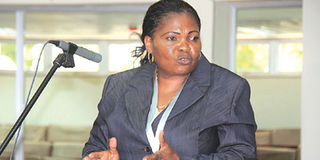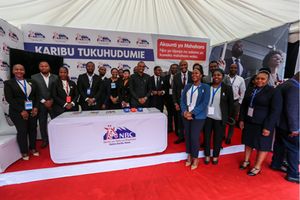TALKING POINT : The (mis)use of statistics law: We’re busy promoting secrecy

The NBS director general, Dr Albina Chuwa
What you need to know:
- The NBS director general, Dr Albina Chuwa (pictured), accused Geopoll of not following the fundamental principles of official statistics, adding that such data could not be officially recognised for use in Tanzania.
Another act of democratic retrogression took place last week in Tanzania when the National Bureau of Statistics (NBS) held a news conference to dismiss as unofficial statistics compiled by the research firm Geopoll.
The NBS director general, Dr Albina Chuwa (pictured), accused Geopoll of not following the fundamental principles of official statistics, adding that such data could not be officially recognised for use in Tanzania.
There are a few pertinent questions here. Just what are unofficial statistics? Who said Geopoll’s statistics were official? Must all statistics be official? Unfortunately, these and many other questions were not answered by NBS during its press briefing. If anything, NBS has reminded us of the heated debate before the Statistics Bill was passed by Parliament and subsequently signed into law in May 2015.
The timing of this piece of legislation aside, analysts had accused government of cracking down on independent research and inquiry by seeking to regulate information resulting from research. In a defensive response, the government prepared a four-page rejoinder arguing that there was no intention to curtail independent research. Things have since taken a different turn, and there are now deliberate efforts to block information generated through independent research and only allow “official” statistics compiled by governmental institutions and approved by NBS.
It was argued two years ago that Section 20 of the Statistics Act was draconian and retrogressive. According to Section 20(1), official statistics shall be statistical information, produced, validated, compiled and disseminated by the bureau, governmental or non-governmental institutions. However, Section 20(2) has a proviso that the statistics produced shall not qualify to be official unless they meet some criteria and standards set by the bureau and approved by the director general.
Furthermore, the law’s bad intentions can also be read in other sections of the Act. For instance, Section 3 states that for statistics to be official, they must be designated as such in accordance with Section 20. Additionally, the bureau is, under Section 6, the custodian of all official statistics in the United Republic of Tanzania.
This means that statistics cannot be deemed official unless they are validated and expressly approved by NBS. Section 17(3) gives the bureau the authority to issue a code of practice that sets out the standards to be followed by all agencies producing statistics before they are deemed official. The bureau shall ultimately set standards and systems for the collection, analysis and production of statistics. According to Section 17(3) (c), this is meant to ensure uniformity in quality, adequacy of coverage and reliability of statistical information.
According to Nigerian writer Chimamanda Adichie, one of the biggest dangers to society is to promote the “single story” practice. According to her, the danger of a single story is that it risks clouding the fact that our lives and cultures are composed of many overlapping stories. For NBS to seek to monopolise the collection, production and release of information in Tanzania is to promote the single story phenomenon that Chimamanda opposes. In short, nobody else other than the bureau should be doing research and compiling statistics. This is dangerous for a society that relies on information.
We need to speak with one voice against attempts to monopolise knowledge. Let us say “NO” to any attempts to control and centralise knowledge generation. People should be allowed to freely undertake research, data collection and production and dissemination of information and statistics regardless of whether they want the resultant data to be recognised as official or not. Let us agree that unofficial statistics should continue to exist alongside “official” statistics. We need to amend the Statistics Act’s bad sections. Imagine statistics gathered and produced by some newspaper having to wait for the bureau’s approval before they are published.
Tanzania subscribes to numerous transparency and information rights frameworks nationally, continentally and globally. How does the ban on independent research augur with our recognition of the Open Government Partnership, Universal Periodic Review or African Peer Review Mechanism?
The Access to Information Act should not have been enacted in 2016 if the government intended to control knowledge generation to the extent being suggested by NBS. You cannot pretend to promote democracy and at the same time curtail basic liberties.
Deus Kibamba is trained in Political Science, International Politics and International Law




